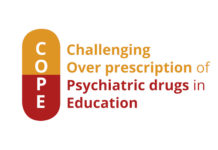Education in the UK is voluntary until the age of five. Hence, having spent the last three decades providing pre-school education, I am constantly grappling with the incongruence that what we teach at nursery to the under-fives is compulsory.
This compulsory regulated curriculum has gone through a plethora of changes since I first opened my nursery in 1991. Perhaps there is a statistical analysis that could be done that neatly correlates this intense early academic pressure, microanalysis, comparisons and measurement of our children with our culture’s growing concerns around the rise in mental health issues. I’m certain I would end up with pretty graphs and a piece of international research (that has probably already been done) that would serve to confirm my instinctive knowing through experience that this connection is a real one.
For example, I recall years ago parents visiting my facility with a baby of around ten months in his fathers arms. We were discussing their trajectory for their son. I never forget this comment made by the baby’s father: ‘Well of course he will be educated at Eton’.
Recently there was the mother of one of my nursery children, a painfully thin lady. She dropped off her beautiful two-year old daughter with these passing words, said in earshot of her daughter: ‘Could you water down her milk please as she is getting fat’. (This little girl was, in no interpretation of the word, overweight).
Another example was the parent who had forbidden her child to play with younger children. (The nursery was introducing a ‘buddy’ scheme to try to encourage emotional intelligence and kindness). However, only older children were permitted as play mates for this child as, in the mother’s opinion, only older children could stretch her child’s academic education and language skills. I tried to inform her that learning to be kind and empathic to younger children, to develop into a sensitive, compassionate person, would serve him well in life; this concept fell on deaf ears. This mother’s main goal was not emotional health, it was academia and how her four-year old son may perform in admission days for his prep school.
I could of course go on and on with such stories, after thirty years in practice enough to fill a bookshelf. These few examples contribute to my troubled internal dialogue that coined my personal labeling of ‘Middle-Class Abuse’. Numerous examples have flooded through the doors of my nursery from consumer-driven parents who state that ‘they only want their children to be happy’. However, what they really mean is that they would like to be able to compare and boast about their children at their dinner table. The direct correlation of a young children’s mental wellbeing with the attitudes and pressures they were under from home became progressively more evident to me. It is the reason that I trained as a ‘systemic family psychotherapist’, to join up the dots of my lived, observed experiences.
Our cultural norm is that our children’s academic achievements have become synonymous and indistinguishable from our own sense of self-worth and society’s expectations and definitions of success. Our individualistic academic measurements that parents demand, and The Office for Standards in Education (Ofsted) promotes, understate the importance of teamwork and emotional closeness in our school system. For our children, this societal academic pressure is the antithesis to being physiologically relaxed.
Clearly, not all parents can be labeled with my subjective sardonic brush, and I have had many years of wonderful clientele that really do only want their children to learn to be kind citizens, and who fight the social norms themselves. Parents who relish their children learning through play or getting messy at the art table where, in my opinion, creativity and the world’s entrepreneurs of the future should be allowed to flourish; if only we did not have an academic curriculum that has brainwashed an entire culture into giving priority to Mathematics and English as core subjects.
Equally concerning is the requirement for Information Technology (IT) in early-years settings. A childcare provider would be significantly marked down in an Ofsted inspection if IT were not widely encouraged and available in pre-schools. Now I do appreciate that, if it were not, we would be bringing up a generation of children who would be computer illiterate. However, paradoxically internet technologies are known to be as addictive as hard drugs. All this ‘flicking’ and quick quick mentality with screen movements must surely be in direct contrast to being able to concentrate and focus? Parents and experts then jump in to misdiagnose ADHD (attention deficit hyperactivity disorder) when it is the legal requirements of our own education system, through compulsory IT, that is hijacking normal brain development in our children. Ironic when considering my earlier point that education is voluntary for the under 5’s, but providers are marked against criteria that demand IT for very young children.
There is a well-documented dispute surrounding ‘ADHD’, its prolific diagnosis and ludicrous claims that it may be genetic in nature. Does it even exist? Can it really be a coincidence that the explosion of ADHD, as one example of our diagnostically-driven society, labelling fidgety jumpy children, may go hand in hand with the fast paced addictive nature of flicking through a screen? Sometimes I despair that common sense isn’t that common.
Once a diagnosis has been sought, and only too easily obtained, the difference in our wealth kicks in. Many families I have worked with in a children’s charity openly discussed that the diagnosis provided them with disability allowances. Many families used to arrive for therapy as a perfunctory duty so that they could claim their money, with seeking therapy as a council tick box. Interestingly, at the wealthier end of society, families like to keep the diagnosis secret. Clients surreptitiously approach my private practice needing assurances that I won’t let the authorities or schools know about their diagnosis or medications. There is then a challenge for me to try to introduce the idea that children drowning under academic expectations may be experiencing stress and that their children’s behavior may be serving a useful function.
This is a conversation that is frequently a sensitive one to have with parents. We live in a society where academia is our measurement of good parenting. Teaching good relationships to encourage our children to develop empathy and manage their emotional regularity is rarely considered. Parents assume that children ‘glean’ this information and don’t identify our society’s individualism and consumerism as the main culprits in causing our ‘mental wealth crisis’.
I have found that creating a genogram (family tree) alongside a client is a useful tool to help them to gain their own ‘meta’ position on their family dynamic. With this tool they can observe their child’s behavior objectively rather than subjectively and be better able to feel the emotional content of a negative stress reaction. Parents are often then able to view patterns in their own behavior and see their children’s behavior as a form of communication.
I explored these ideas of what a teenage girl’s behavior may be saying recently with a client, (who, interestingly, used to be a nurse). This client is always elegantly dressed, and comes in during her lunch hour for her therapy. During the session she discussed her recent family issue which was her 13-year-old daughter having what appears to be the start of anorexia.
Her 18-year-old daughter has had anorexia for many years. My client said, rather perfunctory, that her elder daughter is now chronic and will have it for life. My client had decided not to react as yet to the discovery that her younger daughter has probably not eaten properly for around a year as they had an appointment scheduled with their GP for the following day to discuss this girl’s ‘depression’. Additionally, my client had already decided on her solution to this new problem, in that she would schedule in popping home at lunchtime to ensure her daughter ate lunch.
Earlier on, my client had discussed Mother’s Day, which had just occurred. How she celebrated breakfast with her elder daughter, and how the younger one wasn’t really engaged when it was her mothering time. I felt really devoid of emotion during this session, with no connection at all to the stories being shared. I shared my concerns about my emotional detachment and our session then took a more useful turn. My client and I discussed the similarities between my own feelings and those of her daughters. I felt ‘slotted in’. I was feeling scheduled, (which of course an appointment is) but I was not feeling engaged. My client and I dissected how perhaps her daughters may feel similarly. How the function of the stress of the family, and the behaviours surrounding the eating disorders, were a communication of a desire for connective parenting.
The pressures we are creating through our work schedules and through our education system are toxic. Alternative ideas for education are slowly blossoming, such as forest schooling, yoga, meditation, exercise and the unity of mind-body balance that would enable our children to get in touch with their bodies to develop empathy and social skills. But these schools are alternative, few and far between, and not part of our general accessible system. Hence early academic stress, direct or indirect pressure, and explicit or implicit demands on our children seem to be a contributory root of our mental health crisis.
Within our culture, our children have almost become commodities linked to our consumer-driven world and our definitions of success. These seemingly innocuous and often invisible cultural pressures are not the fault of well-meaning parents. They too are indoctrinated victims of our materialistic and narcissistic value system that is directly damaging our children’s emotional health.
We are drowning in a mental health epidemic that starts subliminally and is leading to the diagnosing of our children based on guesswork, followed by medicating them with addictive Class-B drugs. This may well be a short-term solution to create better ‘Stepford’ students, but we are creating life-long patients.
Somehow we as a society have lost the word ‘we’. The I-phone, the ‘Selfie’, the ‘me me’ of our world and our individualistic mentality has destroyed any community. I often wonder at the absurdity that our society has created individualism as a barometer of success. This filtered into a school system that promoted survival of the fittest, where social and contextual considerations have to be artificially created. Team sports, kindness and emotional wellbeing seem to be extracurricular rather than ‘the’ curriculum.
We create groups for addiction support, community hubs as meeting points and the new exciting Open Dialogue we are trialing as an import from Finland in an effort to radically change our NHS system. I am pleased about this and I am even part of the Open Dialogue trial attempting to create some positive changes. But that doesn’t deter from the absurdity that we are all so preoccupied with individualism that we have to manifest group interactions and situations of unity and inter-connectivity in order to be human beings. I am curious about ancient traditions, as they, when faced with the same challenges that we experience today, did not sit quietly talking but reached out to the whole community, reached out and danced with one another.
Maybe man being an island wasn’t such a great plan? Maybe the school system, the individual rules of attainments, pressures and measures are a damaging plan? Maybe human greed has contributed to our mental wealth crisis?



